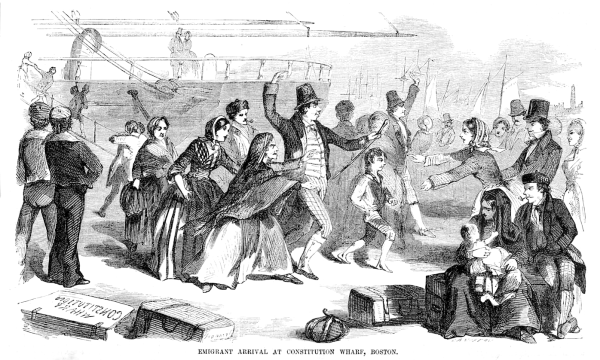June 12, 2024

‘These thoughtless, head-strong, imprudent people’ :
In June 1847, the mass arrival of Famine Irish ignited Nativist resistance in cold-roast Boston
In June 1847, Boston simmered with political, cultural, and religious unrest. A crisis was unfolding along Boston’s docks. Leaking, lurching vessels aptly dubbed “coffin ships” unloaded hordes of Irish refugees fleeing the Great Famine, An Gorta Mor. Some 25,000 arrived in “Black ‘47,” and with thousands wracked by “ship fever,” likely a form of typhus, the city of Boston set up the Deer Island Quarantine Hospital on May 29, 1847, as “the place of quarantine” for ailing immigrants. Just twelve days earlier, May 17, 1847, the British brig Mary, with 46 Famine refugees was refused entry to Boston, and a Revenue Cutter quelled a passenger mutiny.
Intertwined with Bostonians’ legitimate fears of a disease outbreak was a long-running and growing tide of nationwide antipathy toward all things foreign and Catholic. Anti-Irish bigotry was already rampant in Boston, and the mass arrival of desperate Irish Catholics sparked newspaper screeds against them and mass “Native American”—Yankee and Brahmin—rallies against the influx of immigrants.
The ranks of the Native Americans, later dubbed the Know Nothing movement, were swelling in Boston with a platform of “Temperance, Liberty, and Protestantism.” They held a mass gathering on Boston Common in early June 1847 to address the “Pauper Immigrants,” denunciations of the Irish pealing in the sultry air. On June 10, 1847, the Boston Daily Evening Transcript announced: “THE NATIVE AMERICANS held a meeting on the Common last evening. Their next meeting is to be on Fort Hill.” Fort Hill, along with Hope and Ann streets, teemed with tenements for the Boston Irish. For city leaders and the Catholic clergy, the news stoked genuine fears of widespread violence if the local Irish spilled into the streets to take on the Native Americans, the specter of a repeat of the 1837 Broad Street Riot between Yankee firemen and workers and the Irish looming.
Boston’s newspapers were rife with anti-Irish diatribes, the Transcript contending that “had these thoughtless, head-strong, imprudent people [Irish] one ray of discretion when they get on land, their sufferings would be less than they are.”
Long before Bostonians grappled with the health hazard posed by Famine ships clotted with direly ill passengers, the Irish were not welcomed. The city in 1847 was changing – and its Yankee population did not welcome that change. As the shiploads of Famine Irish arrived almost daily, Anglo-Protestant families who had ruled over the city since their Puritan ancestors set foot in the region in the 1620s embraced still the anti-Irish, anti-Catholic prejudice of Boston’s founders. Ephraim Peabody, whose ancestors ranked among the city’s founders, lamented that the Irish were infesting “proper Bostonians’” turf with a horrific “social revolution.” With the city’s population soaring from some 115,000 to over 150,000 in 1847, the newcomers quickly found themselves confronting the very same age-old prejudices that the Irish had faced on the “old sod.” Typical was the Transcript’s comment that the Famine Irish elicited “the disgust of all who see them.”
A Transcript editorial could easily take its place amid today’s MAGA bromides: “The tide of immigration which is increasing daily to a most alarming extent, bringing with it...poverty, sickness, and crime, has excited as it ought, the attention of the whole community, and the people in all parts of the country have at last become aroused, and are turning about to decide means to check an evil which has reached such a height that the very vitality of our country has become endangered by it.“
As the Native American march on Fort Hill neared, Bishop John B. Fitzpatrick, his priests, and the Boston Pilot’s early incarnation pleaded with the Irish of the North End and Fort Hill to remain inside their tenements, “rookeries,” and not provoke the throng of Native American protestors into a full-fledged riot. To the relief of the Archdiocese, Mayor Josiah Quincy, Jr., City Marshal Turkey, and other officials, the Boston Irish complied. They stayed indoors, refraining from pouring outside to battle the Nativists.
Today, the tenets of Nativism course through the nation’s bloodstream again—if they ever really ebbed. Call it Nativism, America First, Know-Nothings, MAGA. They are one and the same. Different era, same hatreds. On the same June day that the Transcript inveighed against Irish immigrants, the paper ran the following brief: “We learn that an Irishman at work on...the Water Works died yesterday afternoon, from previous illness and the heat. He had been in the country only about a week.” The unfortunate man had simply wanted to come to America to work and earn his way. His story has a familiar ring in 2024.

